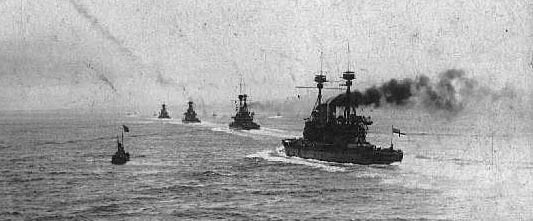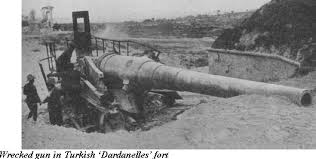A Massive Concentration of Warships.
Turks Fortify Strategic Waterway; Constantinople Threatened.
Special to The Great War Project
(14-16 March) A fleet of sixteen British battleships is gathering in the Aegean Sea just outside the Dardanelles.
This is the narrow, strategic waterway that leads from the Mediterranean to Constantinople, the Ottoman capital and on to the Black Sea.
It’s a massive concentration of naval power, in the planning for months.
There is an ominous feeling among British commanders and soldiers alike that something big – something decisive is about to happen.
There is nervous expectation as well in the Ottoman capital.
The Turks, supported by German military advisers, build up their defenses in the straits, deploying big guns along the Turkish side of the straits, strengthening ancient fortresses there. This waterway, known to the ancients as the Hellespont, has seen war many times in the past, going back to the time of the Roman Empire and further back to the Greek wars with the Persians.
The Turks also spread mines in the waterway, hundreds of them, making the narrows highly dangerous for the British ships to force their way through. Should the British do just that, Constantinople is a short distance away and highly vulnerable.
The British do bring a small contingent of troops but not a substantial army. Winston Churchill, the First Lord of the Admiralty, convinces the other members of the War Council in London that naval power can do it all. A large ground force is not needed, Churchill argues, and in any case, the stalemate on the Western Front means there are few if any British troops to spare to mount an assault in the Dardanelles.
Churchill and other British leaders have little respect for their Turkish adversaries; they believe the job of “forcing the Dardanelles” will be accomplished quickly. As a consequence they hope a British victory will knock the Ottoman Empire out of the war, and could lead to the collapse of Germany and the Austro-Hungarian Empire as well.
Writes historian Norman Stone, “A British push [through the Dardanelles] might just finish off the Turks, and the Straits would be opened again for trade with Russia. The Balkan states and Italy might be encouraged to join in the war on the Allied side.”
“Late in 1914,” Stone writes, “the British offered Constantinople to the Russians, and went on to plan for partition of the entire Ottoman Empire among various allies.”
“No one expected the Turks to be capable of serious resistance.”
Except the Turks.
Writes historian Sean McMeekin, among the defensive measures the Turks take “to meet a possible Russian amphibious landing force rumored to be gathering in Odessa [across the Black Sea], guns had been placed in the forts along the Bosphorus, ranging all the way to the Black Sea, buttressed by mobile battalions.”
“Here was history in the grandest sense,” writes historian McMeekin, “Europe facing Asia, once pitting Greeks against Persians, now ranging European Christians opposite Ottoman Muslims – assisted by [the Germans] their honorary non-infidel European allies.”

